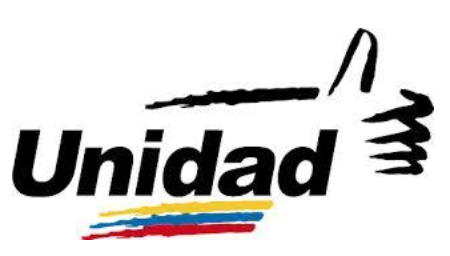Venezuela’s opposition coalition Mesa de la Unidad Democrática (MUD) appears to have found its direction after several weeks of turmoil. New agreements suggest greater incorporation of “social leaders,” more effort in favor of the release of political prisoners, as well as a more rigorous demand that MUD parties follow the official line.
On July 30, MUD Secretary General Ramón Guillermo Aveledo, announced his resignation from the post. Soon afterwards, the Sub-Secretary, Ramón José Medina, also resigned.
The resignations followed a closed-door meeting of representatives of MUD parties on July 28. Narratives of the meeting pointed to deep divisions between radicals and moderates. These divisions reached a crisis point in mid-July when Medina jokingly suggested that the MUD would not seek Leopoldo López’s release from jail since he himself had concocted the plan to be jailed.
There have been two basic issues at play. On the one hand, there has been disagreement regarding how much “unidad” should characterize the MUD. On the other, there has been disagreement regarding what direction this unidad should take.
The latter issue is clearer than the former. For opposition radicals Leopoldo López is an imprisoned hero that should be used as a symbol to motivate continued street protests against the Maduro government. These are the leaders who pushed forward with the la salida movement in January that generated a protest wave lasting close to four months.
Maria Corina Machado has more recently proposed a “citizen’s congress” to keep street movement alive. But the major parties have not expressed their support. On August 12 Machado went ahead with the first session. Nevertheless she expressed that she hoped to “maintain links with the MUD,” and that the only objective of the activity was to “articulate citizens.”
For opposition moderates, la salida was a strategy hatched by López to wrest leadership of the opposition from Henrique Capriles. For them it was a strategic mistake.
The main parties inside the MUD, Primero Justicia (PJ), Acción Democrática (AD), and Un Nuevo Tiempo (UNT) favor a long term strategy that focuses on winning the majority for the opposition in the National Assembly in those elections and on reaching out to disgruntled chavistas.
Aveledo also complained of a lack of internal disciplinary mechanisms which led to parties “not abiding by what was agreed. They not merely defended their right to dissent, but to not abide. How can you guarantee that agreements will be fulfilled?”
He was referring to the fact that the MUD had come to an agreement in January that pointed in a quite different direction from the sequence of events generated by la salida.
“The MUD defined its policy at the beginning of 2014, but it got bogged down in the national conflict and was unable to apply it. We were aiming at the construction of a social majority that developed by focusing the opposition on economic and social issues. I won’t cry over spilled milk, but the first semester was wasted.”
The second line of continuing negotiation is over just how unified la Unidad should be. Aveledo responded to criticisms from radicals that the MUD had “only” electoral motivations by claiming that this was precisely its virtue: “the MUD achieved electoral, strategic, and programmatic unity.” Nevertheless, he himself suggested that what “unity” means needs to be clarified.
“There are areas that belong to the sovereignty of the parties and others of the alliance [MUD], and I insist these areas have to be defined.”
The MUD leadership has had two more closed-door meetings. The August 13 meeting seems to have produced a new unity agreement among the 25 parties that form the organization. Details have not been made public but have been trickling out in press conferences and interviews.
On August 13 Vice-President of Un Nuevo Tiempo, Delsa Solórzano, said the re-launched coalition will include “social leaders and independents.” The protest cycle from February to May included was largely driven by non-party organizations, many of whom did not feel represented the MUD.
One important concession made to the “la salida” faction is a renewed emphasis on political prisoners. Freddy Guevara, coordinator of Leopoldo López’s Voluntad Popular declared: “We will no longer have the passivity we saw before, now the defense of Leopoldo López and of the political prisoners in general will be one of the main lines [of the MUD].”
Secretary General of PJ, Tomás Guanipa suggested that “all decisions, from now on, will be reached by consensus.” However he also warned, in clear reference to Voluntad Popular and other opposition radicals: “we hope that in this new stage everyone will play fair. We have agreed to respect the rules and abide by our decisions. Those who don’t, are out of the Unity…Unanimously we have recognized that the struggle must be social, on the streets but pacific, energetic, constitutional and electoral. We need to take the safest road and leave aside any shortcut that would only lengthen the life of this government.”
No new Secretary General has been named. Members of the MUD have suggested that a new leader will be selected within approximately one month.




